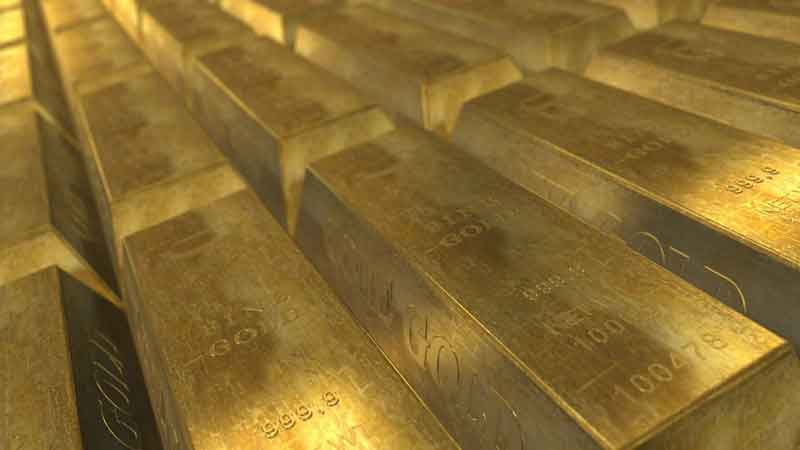
The endemic story that will occupy financial folks for the next few days is whether the dollar's reign as the world's principal reserve currency is coming to an end. This is actually a twofer, because it ties in with another endemic story line - the fluctuating price of gold.
Earlier in the month, there had already been some fretting about the dollar's relative slide in exchange markets. The Financial Times quoted the head of foreign exchange strategy at Credit Suisse explaining, "The U.S. simply faces more risks than other major economies at this point." FT's reporters also explained that "demand for the dollar as a haven asset is easing."
The prompt this week was a Goldman Sachs research note by Daniel Sharp explaining the rising price of gold. The essay argued that rising demand for gold was a harbinger of the dollar's waning status as a reserve currency: "It is being driven by a potential shift in the U.S. Fed toward an inflationary bias against a backdrop of rising geopolitical tensions, elevated U.S. domestic political and social uncertainty, and a growing second wave of covid-19 related infections.
Combined with a record level of debt accumulation by the U.S. government, real concerns around the longevity of the U.S. dollar as a reserve currency have started to emerge." This generated a predictable geyser of news analyses.
I am old enough to have heard warnings like these many times before. Indeed, I am old enough to have written more than a few articles explaining that the dollar is not going anywhere. I am definitely old enough to point out that Sharp's analysis has a strong whiff of 2010 about it. That is the last time a bunch of economists predicted rampant U.S. inflation because of U.S. macroeconomic policy, a prediction that did not come to pass.
To be fair, Sharp acknowledged this point in a sentence that did not get as much press coverage: "While debasement in many cases leads to inflation, it is not always the case as witnessed over the past decade." He further noted that gold was not the best commodity to buy as a hedge against inflation (that would be oil). But this was a research note about buying gold, and one plausible reason to suggest buying gold right now is that there are concerns about the dollar.
Except that while the dollar is likely to depreciate, concerns about the dollar's status as the global reserve currency are not terribly convincing. Capital leaving the safe haven of the dollar is actually a good thing for the global economy. It signals an end to crisis fears and the able exercise of U.S. leadership in the financial realm. So the dollar should fall in value relative to what was happening in March.
Does this mean the dollar's reserve currency status is coming to an end? No. The alternatives remain far worse. Gold is an unwieldy, volatile commodity - it has its uses as a hedge against worst-case scenarios, but a gold-based reserve currency unit would be a surefire recipe for deflation. If economies in the Organization for Economic Cooperation and Development are wary of relying on Huawei, there is no way they will rely on the renminbi. For the first time in a while, one can talk about the euro as a possible challenger to the dollar.
In even a best-case scenario, however, it will take years for the Eurobond market to be deep and liquid enough to rival U.S. capital markets. Any concern about the dollar's status remains purely notional.
As Bloomberg's Eddie van der Walt and Liz Capo McCormick point out, "Gold can also be considered a Veblen good, which means that as its price goes up, it can become even more desired. When gold rallies, it excites commentators and investors - so more is written about it, which can lead to more money flowing in. At those times, rallies can become self-perpetuating." This, too, has been an endemic feature of global financial coverage in this century.
Predicting the end of the dollar is always a great news cycle. It remains little more than that. Ironically, this week Simon Tilford and Hans Kundnani argued in Foreign Affairs that the United States should voluntarily relinquish the dollar's role as a reserve currency. Whatever one thinks of their arguments, however, they reach the same conclusion I do: "At the moment, the dollar looks more dominant than ever."
Sign up for the daily JWR update. It's free. Just click here.
(COMMENT, BELOW)
Drezner is a professor of international politics at the Fletcher School of Law and Diplomacy at Tufts University.
Previously:
• 03/31/20: The most counterintuitive prediction about world politics and the coronavirus
• 03/06/20: It turns out anti-populism is pretty popular
• 07/09/19: Everything you wanted to know about the international implications of zombie pig invasions but were afraid to ask
• 04/19/19: No one tell my mother about this column
• 04/04/19: The biggest strategic misread in Washington is about the other great powers
• 04/01/19: A nemesis is fine. A good news friend is better
• 02/26/19: Why I'm starting to worry about the dollar
• 02/05/18: Why I'll continue to watch the Super Bowl
• 01/17/18: The good news about Hawaii's false alarm
• 08/08/17: Princess Leia, PhD
• 12/05/16: The Orwellian nightmare for policy wonks is coming
• 09/20/16: Could the erosion of trust in government be at an end?
• 08/24/16: HUH!? Grad students at private universities can now unionize
• 08/23/16: What is it about Henry Kissinger?
• 08/09/16: A Very Important Column about . . . cargo shorts
• 07/04/16: 2016 is a fascinating year for politics, and that's awful news for political scientists
• 06/02/16: The twilight of the 'West Wing' economy?
• 05/20/16: A very important column about . . . the global governance of superheroes
• 05/12/16: Why Trump seems invulnerable to the flip-flop charge
• 05/11/16: Confessions of a Luddite professor
• 03/29/16: The trouble with writing about Donald Trump
• 02/29/16: Nobody will admit to the real reason Donald Trump is winning


 Contact The Editor
Contact The Editor
 Articles By This Author
Articles By This Author